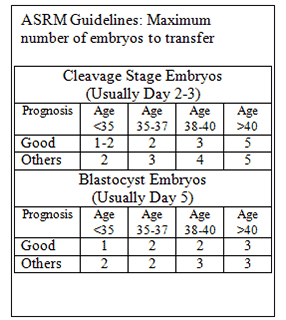Starting IVF Treatment
To start an in vitro fertilization (IVF) cycle, you will first need to meet with one of our physicians to review the medical history and to assess your prognosis. It’s important for each patient to understand her chance, as an individual, of having a pregnancy resulting in a live birth.
At the initial IVF consultation, your doctor may ask you to complete additional tests to assess your prognosis. This visit will include an in-depth overview of the IVF process.
At the follow-up consultation, the physician will address any additional tests obtained and how they may impact your prognosis.
Additionally, s/he will discuss the number of embryos to be transferred (based on the ASRM embryo transfer guidelines on the right side of this page), the issue of embryo freezing (cryopreservation), and the risks of IVF.
After meeting with the doctor, a meeting with the financial counselor is prudent.
Starting IVF treatment steps
Once you have decided to pursue IVF, our IVF coordinator will help guide you through the process. The IVF coordinator will be sure that all needed tests have been performed and will help schedule your IVF cycle.
Preparation for your IVF cycle
-
- When your menses begin, call the IVF coordinator.
- Any tests that need to be completed will be scheduled.
- Your medicines will be ordered, and an injection teaching class will be scheduled.
- You may be prescribed oral contraceptive pills for 9-21 days.
- If no HSG or saline sonogram has been performed within the last six months, a repeat saline sonogram will be performed.
Once the workup is complete and your fees are paid, a trial embryo transfer will also be scheduled. At this visit, your doctor will place an embryo transfer catheter into the uterus to measure the depth of the uterine cavity and identify any difficulties that we might encounter on the day of the actual embryo transfer. This reduces the chance that your real embryo transfer will be difficult.
Testing checklist before starting IVF
For women
-
- Day 3 FSH, Estradiol
- Antral follicle count
- Saline sonogram
- Blood type and screen
- Complete blood count
- Rubella
- RPR (screens for syphilis)
- Hepatitis B & C
- HIV 1 & 2
- Pap smear
- Chlamydia/Gonorrhea
For men
-
- Hepatitis B & C
- HIV 1 & 2
- RPR
- Semen analysis
IVF cycle
There are several stimulation protocols used to perform IVF. Each of these protocols is designed to help a woman produce more than the usual number of eggs. These downloadable PDF documents offer step-by-step explanations of what to expect throughout the process and what the woman will need to do at each stage:


